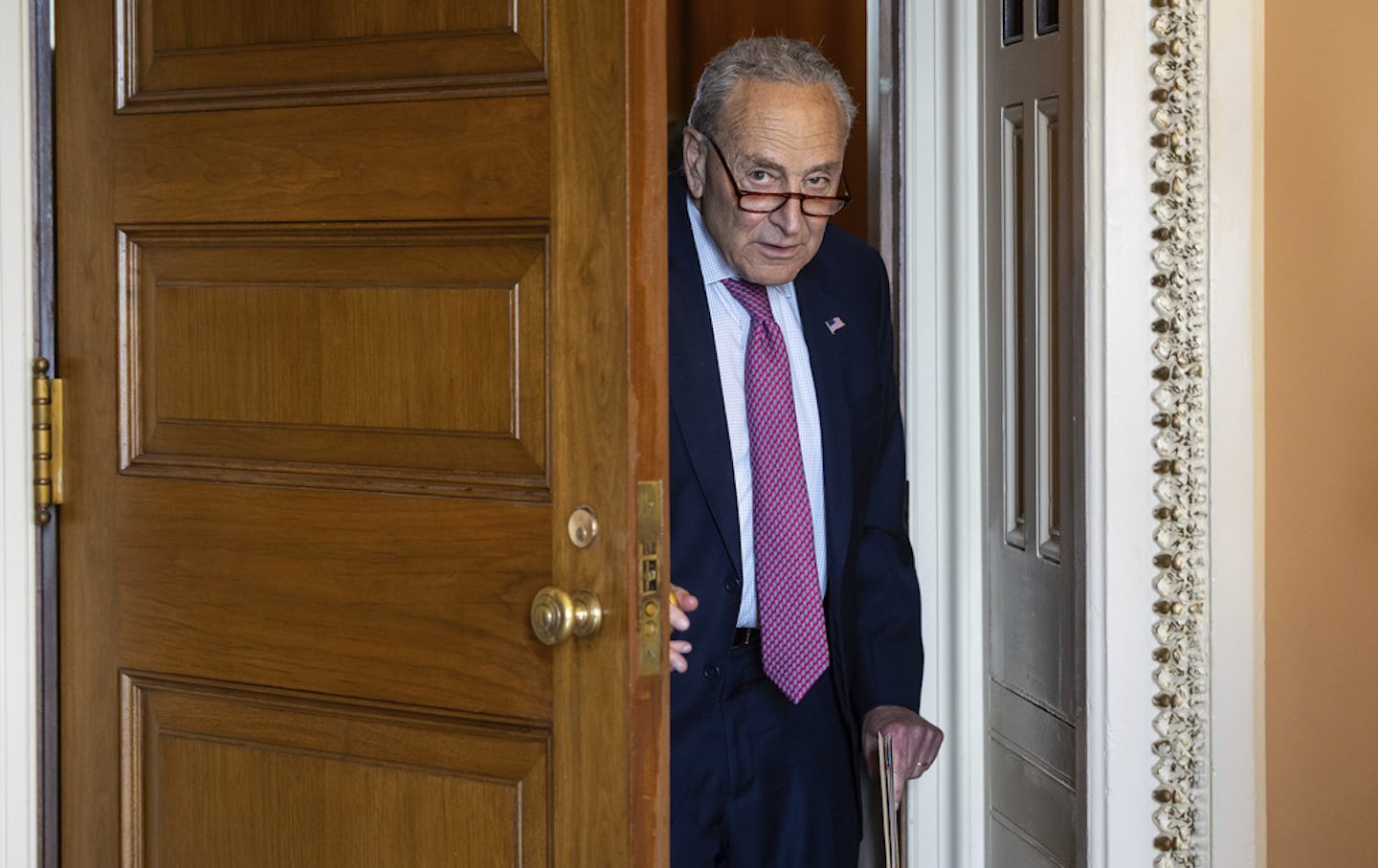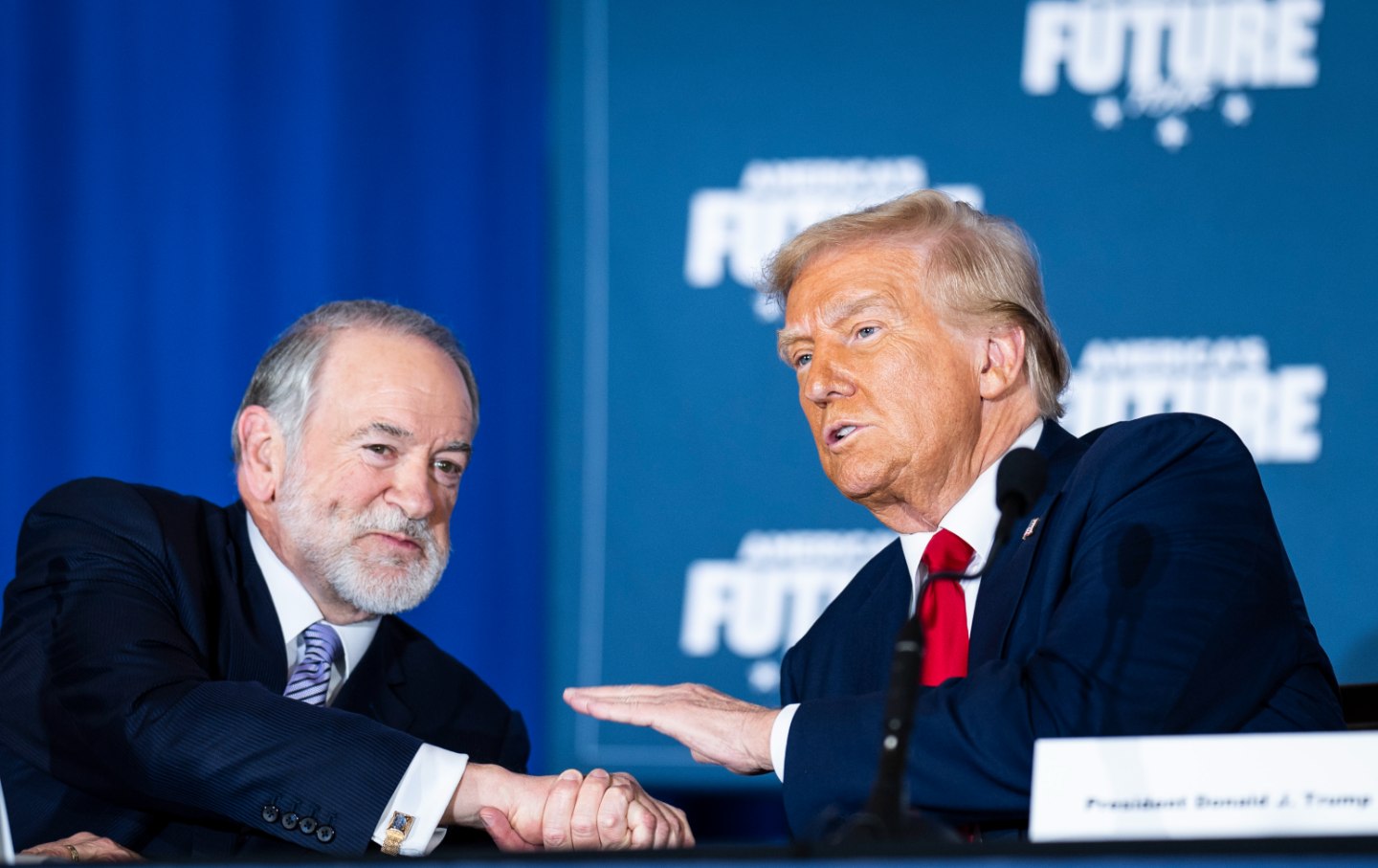A Guide to Some of the Key Movers and Influencers in Trump’s Orbit
While showboats like Elon Musk and RFK Jr. get all the attention, the real power in a second Trump term is likely to be wielded by quietly effective bureaucrats and policy intellectuals like these men and women.

Shortly after Donald Trump won reelection to the presidency, he announced a series of cabinet nominations that redoubled his past derangements of executive-branch governance, tapping a confederacy of thieves and shysters—from accused sexual assaulter Pete Hegseth as secretary of defense to loyal baksheesh recipient and Jeffrey Epstein helpmeet Pam Bondi as attorney general to vax-denying conspiracy monger Robert F. Kennedy Jr. as director of Health and Human Services. This is to say nothing of his standard-issue trolling nominees, like Tulsi Gabbard as head of the Directorate of National Intelligence or Elise Stefanik—the dictionary definition of whatever the opposite of a diplomat is—as ambassador to the United Nations. But for all the fireworks attending these big-name announcements, the real power in a second Trump term is likely to be wielded by quietly effective bureaucrats and policy intellectuals—people who intimately understand, and gleefully prosecute, politics as war by other means. Even though the disbursement of power behind Trump’s throne is far from a settled question, here’s a preliminary guide to the key figures to watch as the authoritarian nightmare before us unfolds.
Stephen Miller
Along with the returning president, Stephen Miller is the most prominent holdover from the first incarnation of the Trump White House. It’s not hard to see why. Miller stormed to the front ranks of Trump promoters in DC when he left his gig as communications director for Alabama Senator Jeff Sessions to lay the foundations for Trump’s brutal immigration policies, beginning with the ban on Muslim travelers and continuing on to family separation at the border and the use of public health statutes to shut the border down during the Covid pandemic. His official title, senior adviser, deliberately obscured the scale of his in-house influence: By the end of Trump’s term, Miller was the vindictive face of MAGA xenophobia and grievance politics, and the most effective force translating them into policy.
During the Biden interregnum, Miller spent his time outside of government at the helm of the America First Legal Foundation, a right-wing litigation clearing house that aggressively pursues a MAGA agenda in the courts. Miller touted it as “the long-awaited answer to the ACLU,” but unlike that group, which pursues free-speech litigation on behalf of unpopular conservative clients as well as a roster of left-leaning plaintiffs, America First Legal goes to court only in service of Trumpian crusades. It brought suit against putative trans indoctrination in the Mesa, Arizona, school district, and has sued both corporate and university employers in cases of alleged reverse discrimination brought by white male plaintiffs. The group also filed an amicus brief in Trump’s Mar-a-Lago documents case, claiming that the National Archives lacked the legal authority to make a criminal referral—an argument that even Trump-osculating federal judge Aileen Cannon called a “red herring.”
Red herrings are pretty much the group’s stock in trade. In 2022, America First spent just $1.7 million on legal expenses and more than $29 million on promotion and advertising. Miller’s position as a carny barker for the right-wing Kulturkampf was brought to light once more this fall, when the Chilean reporter José María Del Pino did what virtually none of his US counterparts can be stirred to do and repeatedly challenged Miller’s bogus claim that violent criminals were disproportionately represented in the ranks of recent Venezuelan immigrants to the United States.
Yet peddling discredited urban legends about immigration is an executive-branch credential that Trump and Miller have reinvented—and so Miller is back in action as Trump’s deputy chief of staff. Like his former job title, this one is deceptively modest. With Trump already committed to launching mass deportations under the pretext of a national immigration emergency on his first day back in office, Miller will once more be driving the signature domestic policies of the White House. And with the extensive list of congressional and legal allies he compiled at America First, he will be able to command yet greater deference throughout the Republican power structure. As Trump embarks on shaping his second term as a prolonged revenge tour, Stephen Miller will, against all odds, be a much more lethal dispenser of punishment from on high than he was the first time out.
Curtis Yarvin
You probably already know about the reactionary excesses of Vice President–elect JD Vance: his hardcore natalist opposition to reproductive rights, his dalliances with replacement theory, his election denialism, his blood-and-soil brand of Herrenvolk nationalism. But you may not know about the figure who’s served as a fascist pied piper to Vance and scores of other Silicon Valley heimat bros: the pro-slavery monarchist Curtis Yarvin, who blogs under the pseudonym Mencius Moldbug. During his 2022 Senate run, Vance embraced one of Yarvin’s pet causes—an initiative called Retire All Government Employees, or (should the radical character of the plan somehow elude you) RAGE. Vance laid out the reasoning behind it in a podcast interview a year earlier, declaring that in a second Trump term, “We need to fire every mid-level bureaucrat, every civil servant in the administrative state, replace them with our people.” Pressed on the legality of this rolling purge, Vance said that Trump should just ignore the law. Now this frontal assault on government workers is also a central plank of Project 2025, the Heritage Foundation’s blueprint to transform the federal government into a sequel to The Handmaid’s Tale during a second Trump term.
The animus behind Yarvin’s agenda comes from a paranoid vision of key social institutions—the government, the universities, the media—as a monolithic “Cathedral” of addled progressive groupthink that somehow exerts a Sauron-like power over American public life. (Labored Lord of the Rings metaphors are a tic of Yarvin’s prose style—a common affliction among Valley reactionaries, most notably in the maunderings of fellow Yarvinite and Vance patron Peter Thiel.) Resistance to the Cathedral’s perfidy, in the Yarvin worldview, is justified by any means necessary. In a 2022 interview with Vox, Yarvin enthused that “you’re not that far from a world in which you can have a candidate” overthrow the Cathedral from the top down. “I think you can get away with it,” he said. “That’s sort of what people already thought was happening with Trump. To do it for real is not going to make them much more hysterical, and it’s actually much more effective!” While Yarvin won’t likely have any formal ties to a Trump White House, he won’t need them: Trump’s chief lieutenant is an enthusiastic true believer.
Russell Vought
Russell Vought, who served as director of the Office of Management and Budget (OMB) in the first Trump administration, is perhaps the quintessential conservative-movement insider. He’s spent his time outside of government running a Christian nationalist think tank called the Center for Renewing America, a theologically tinged hothouse of conspiracy theories, election denialism, and lurid right-wing persecution fantasies. Vought led the policy committee at the 2024 Republican National Convention and, perhaps most crucially, is the central architect of Project 2025. In his contribution to the Heritage Foundation’s policy bible, Vought pledged holy war on a federal bureaucracy allegedly gone amok “carrying out its own policy plans and preferences—or, worse yet, the policy plans and preferences of a radical, supposedly ‘woke’ faction of the country.”
It’s the same lamentation you hear from Curtis Yarvin, albeit in a less vulgar, more pious register. And Vought’s proposed remedies are just as radical as Yarvin’s. Among the measures he endorses to face down the Great Satan of the administrative state are the abolition of the Environmental Protection Agency and the use of federal military force to quash dissent. “We have detailed agency plans,” Vought bragged in a 2024 speech. “We are writing the actual executive orders. We are writing the actual regulations now, and we are sorting out the legal authorities for all of what President Trump is running on.”
Vought was reportedly in the running to serve as chief of staff in the second Trump White House, but he’s now on track to reprise his role at OMB, the key nerve center of day-to-day White House operations. In one way or another, he’s sure to preside over the federal bureaucracy with singular righteous zeal, exhorting his corps of Christian soldiers to continue marching as to war.

Susie Wiles
A cochair of Trump’s 2024 campaign, Susie Wiles is the quintessential power behind the throne. A steady stream of media profiles throughout the campaign stressed her quiet influence and her penchant for staying out of the spotlight—traits that put her at odds with former Trump campaign director Corey Lewandowski, who was brought on to unleash Trump’s thwarted rage for chaos in the homestretch. Wiles emerged from that power struggle with her influence intact—and, within days of Trump’s victory, he had tapped her as his chief of staff.
Trump clearly wants to depart from the initial miscues he made in filling that position in his tumultuous first term, and Wiles is perfectly positioned to take up the maximum-sycophant mantle relinquished by Trump’s indicted January 6 co-conspirator Mark Meadows. For all her careful burnishing of her image as a competent, retiring campaign hand, she has, like most campaign professionals, a decidedly Machiavellian streak; there’s a reason her colleagues have designated her “the ice maiden.” Wiles famously fell afoul of her other big-ticket MAGA client, Florida Governor Ron DeSantis, after an internal power struggle within his campaign brain trust: DeSantis later accused her of leaking damning documents about his cozy relationships with lobbyists and donors. DeSantis’s allegations appear to be baseless, but his hostility toward the mastermind behind his narrow 2018 election to the governorship rages on; he got Trump to cashier Wiles in 2019 and initially told Trump in 2020 that if he went ahead with plans to bring her back, he might withdraw his support. (Of course, DeSantis’s later 2024 primary run against Trump rendered all such threats moot.)
Popular
“swipe left below to view more authors”Swipe →Now Wiles is very much in the deepest reaches of Trump’s circle of trust; according to federal prosecutor Jack Smith’s indictment in the Mar-a-Lago prosecution, she was one of the unnamed people to whom Trump showed a classified map of an unnamed country, and she reportedly met with Smith’s investigative team about the purloined papers. With the prosecution deep-sixed by the Trump-appointed federal judge Aileen Cannon, no one is likely to know anytime soon what the candidate and his campaign manager were conferring over—but the whole set piece was no doubt encouraging to Trump as he sought to audition a toadying new chief of staff in the Meadows mold. With a proven legacy of accomplishment in what now passes for normie Republican politics, Wiles should be ideally positioned to gratify Trump’s operatic quest for vengeance and dominance while ensuring the internal workings of his White House.
Boris Epshteyn
A longtime legal fixer for Trump, Boris Epshteyn has gained greater influence as the president-elect’s legal troubles have multiplied. Epshteyn, a former investment banker who worked for a controversially short stint in the communications office of Trump’s first presidency, was the adviser who directed Trump to attempt to delay all the pending trials before him with a blizzard of obstruction tactics—a strategy that now has Trump in a position to pardon himself and effectively terminate most of the proceedings against him. (It’s also noteworthy that Epshteyn himself stands to benefit from this blanket legal offensive, as he faces nine felony counts of election fraud stemming from his role in promoting a slate of fake Arizona electors to overturn Biden’s victory there.)
As this résumé entry shows, Epshteyn is an enthusiastic political brawler and a die-hard Trump loyalist. He entered national politics as an aide to Sarah Palin when she was a vice presidential candidate; after he wore out his welcome in the White House communications office, Epshteyn recorded a series of fawning video commentaries about Trump that ran as mandatory programming across the vast right-wing Sinclair TV network. Even in his role as transition whisperer, Epshteyn managed to combine extreme fealty with extreme opportunism, reportedly soliciting pay-to-play fees from would-be cabinet appointments. Thus far, Trump has stood by his designated crony; after all, Trump would never have surged into national leadership if he hadn’t been a devoted student of government-by-corruption.
Whether Epshteyn ultimately stays or goes, his fingerprints are already all over the new Trump White House. He reportedly helped engineer the appointment of Scott Bessent to head up the Treasury Department (after supplying the nominee with a crash course in Trumpenomics by, allegedly, soliciting one of the aforementioned bribes), and he has also been pivotal in remaking federal law enforcement into an outlet of MAGA mob justice by maneuvering loyal apparatchiks like Pam Bondi and Kash Patel into key positions. Epshteyn has also reportedly advocated that Trump bypass traditional FBI clearances for his cabinet nominees and instead rely on an informal series of background checks conducted by contracted private investigators.
His outsize role has indeed drawn the ire of another prominent toady of the Trump transition team, Elon Musk, who reportedly has challenged Epshteyn’s authority on key cabinet picks; an explosive rhetorical race to the Trump-appeasing bottom ensued between the two flunkies at a Mar-a-Lago dinner table.
Epshteyn has already sought to leverage his influential role in shaping the new Trump White House into a post as envoy to broker an end to the Russia-Ukraine war—even though the Russian-born lawyer has zero background in diplomacy or foreign policy. Trump reportedly took the request under serious consideration before dismissing it—at least for now. But it’s clear that Epshteyn possesses the only credential that matters in a Trump White House. “He always sought to be close to Trump,” an official from Trump’s first campaign told Politico. “He tells the president what he always wants to hear.”
Support independent journalism that exposes oligarchs and profiteers
Donald Trump’s cruel and chaotic second term is just getting started. In his first month back in office, Trump and his lackey Elon Musk (or is it the other way around?) have proven that nothing is safe from sacrifice at the altar of unchecked power and riches.
Only robust independent journalism can cut through the noise and offer clear-eyed reporting and analysis based on principle and conscience. That’s what The Nation has done for 160 years and that’s what we’re doing now.
Our independent journalism doesn’t allow injustice to go unnoticed or unchallenged—nor will we abandon hope for a better world. Our writers, editors, and fact-checkers are working relentlessly to keep you informed and empowered when so much of the media fails to do so out of credulity, fear, or fealty.
The Nation has seen unprecedented times before. We draw strength and guidance from our history of principled progressive journalism in times of crisis, and we are committed to continuing this legacy today.
We’re aiming to raise $25,000 during our Spring Fundraising Campaign to ensure that we have the resources to expose the oligarchs and profiteers attempting to loot our republic. Stand for bold independent journalism and donate to support The Nation today.
Onward,
Katrina vanden Heuvel
Editorial Director and Publisher, The Nation
More from The Nation

The Opposition Party That Wasn’t The Opposition Party That Wasn’t
With Democrats failing to put up much of a fight against the Trump administration, favorability ratings have plummeted to an all-time low.

Group Chat War Plans Provide a Window Into Trump’s Mafia State Group Chat War Plans Provide a Window Into Trump’s Mafia State
American foreign policy is now all about incompetent shakedowns and cover-ups.

One of These Progressives Could Be New York’s Next Mayor One of These Progressives Could Be New York’s Next Mayor
On Saturday, seven mayoral candidates made their case to the Working Families Party and The Nation magazine in advance of the June primary.

The Democrats Have Disappeared The Democrats Have Disappeared
As Trump and Musk bulldoze democracy, the Democratic Party is MIA. While Republicans use government to cripple the opposition’s ability to compete, Democrats whine about “no...

Democrats: Tell Mike Huckabee to Go to Hell Democrats: Tell Mike Huckabee to Go to Hell
Trump’s nominee for Israel ambassador believes that we need bloodshed in the Middle East to bring about the end times. Nobody could be a worse choice.



